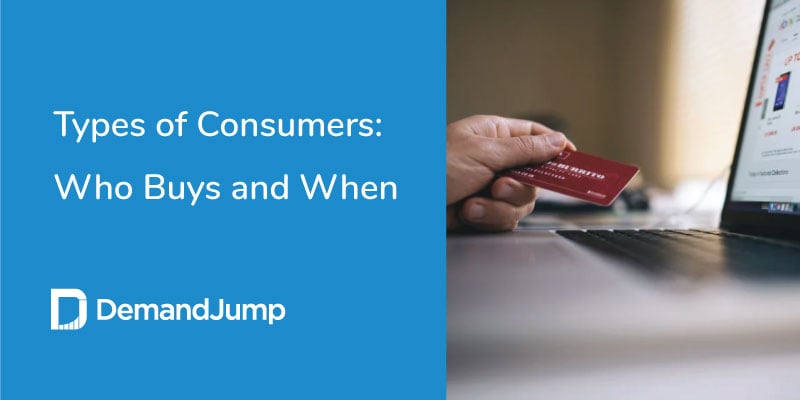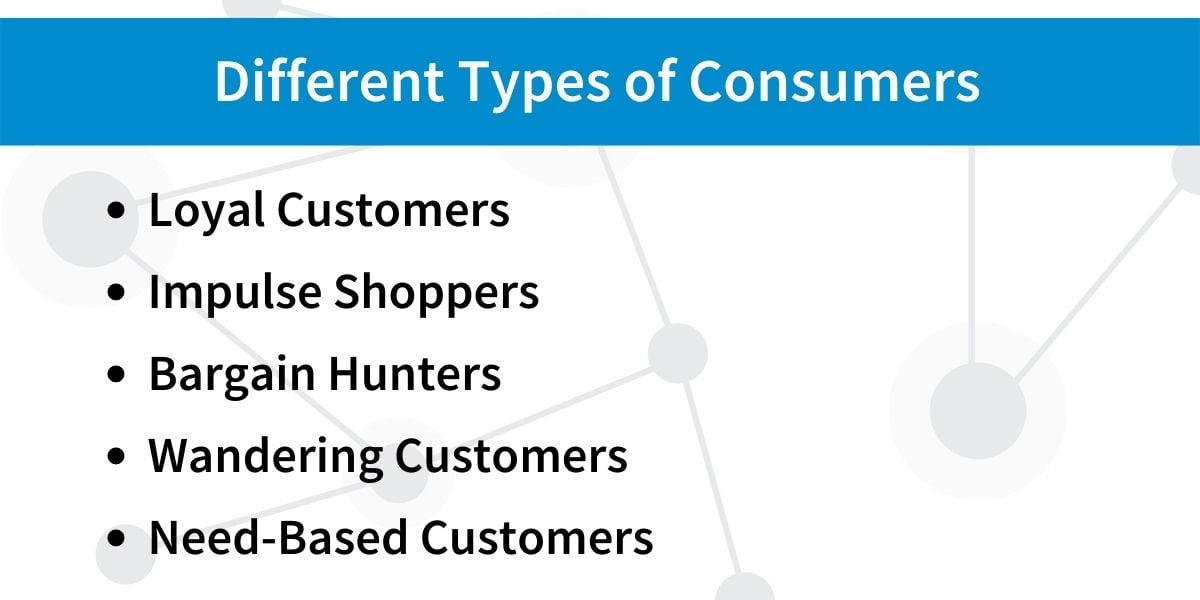Types of Consumers: Who Buys and When
June 25, 2020 •DJ Team

Five Types of Consumers in Marketing
Marketing strategies of the past have largely relied on a one-size-fits-all approach where the most important aspect was getting the message to as many people as possible, but the modern marketplace calls for a more targeted approach. Reaching the right customer at the right time is far more effective than taking a mass approach designed to simply maximize exposure and hope something sticks. Research shows that there are 5 types of consumers in marketing and that they all require slightly different attraction and retention techniques. Here's what you need to know about consumer-based marketing.

What Are Different Types of Consumers in Marketing?
- Loyal Customers
- Impulse Shoppers
- Bargain Hunters
- Wandering Consumers
- Need-Based Customers
Consumers are generally typecast according to their behavior, and more and more, that behavior occurs online. Following are the most common five types of consumers in marketing.
Loyal Customers
Loyal customers make up the bedrock of any business. As the name implies, loyal customers are those who have made a commitment to your product or service. Even though they may comprise the smallest percentage of your overall consumer base, your loyal customers are also the most likely to generate the majority of your income. As an added bonus, they're far more likely to recommend your company to others.
However, it's important not to make the mistake of taking loyal customers for granted — they're as likely as anyone else to move on to greener pastures if your business isn't meeting their needs and preferences. It's essential to keep this customer base involved, engaged, and feeling as if they're valued by your company. Consider adding reward programs and interactive social media to keep them coming back.
Impulse Shoppers
Impulse shoppers are those simply browsing products and services with no specific purchasing goal in place. This consumer segment generates significant revenue for most retailers. This type of consumer is usually receptive to upselling and has the potential to become a loyal customer if products and services meet or exceed their expectations and desires.
Bargain Hunters
Bargain hunters are seeking the best deal, period, and most likely won't be swayed by upselling techniques — in fact, this may cause them to move on. This type of customer has very little potential to become a loyal customer unless it's part of your business strategy to offer the lowest possible price points at all times. This customer also rarely, if ever, makes purchases on impulse. Advertising sales is the best way to appeal to those in this customer group.
Wandering Consumers
Wandering customers are somewhat related to impulse shoppers, but they're much less likely to make purchases. This type of customer is more prevalent in brick-and-mortar locations, but they do stumble into online retail venues on occasion. It's sometimes possible to make a sale to those just wandering through provided you can stimulate their interest, but keep in mind that many of them are simply attracted to the social interaction of shopping and have no intention of making a purchase.
Need-Based Customers
As the name implies, need-based consumers are driven by the need for a specific product or service. Although these customers generally make purchases decisively and quickly once they find what they're seeking, they're easily lured away by competing businesses. However, they're frequently converted into loyal customers. They often have practical questions or concerns that can be addressed with a proactive social media presence.

As you can see from these consumer buying behavior examples, different marketing approaches work better for different consumer groups. Today's businesses have more marketing options than any of their historical counterparts, but many are unsure of the best way to use these resources. You probably already know that it's important to understand the types of consumer markets as well as the types of online consumer behavior in order to craft an effective and profitable marketing strategy, but you may be struggling with how to put this into practice — and that's a perfectly normal response to the plethora of information and consumer behavior examples available to those trying to devise a customized marketing strategy.
Taking the Guesswork Out of Modern Marketing
Whether you’re new to marketing or an expert in your field, DemandJump can help you understand what is working with your digital marketing and content marketing efforts and where you can improve. The platform identifies consumer behavior patterns such as the search terms they're using and what other websites they've visited in their search for products and services.
Getting content in front of your target audience throughout the buying journey is easier said than done. DemandJump's Consumer Insights platform informs every piece of your content marketing strategy. Where traditional content tools simply provide data, the DemandJump platform recommends specific content to write, providing rich content outlines for each recommendation, allowing marketers to create more valuable content while automating hours of keyword and SEO research - all the marketer has to do is input a topic.
To simplify your content strategy and see how you stack up against competitors, get started for free today!
Featured Articles
Categories
- Attribution Tracking (13)
- Channel Optimization (11)
- Consumer Insights (68)
- Content Marketing (251)
- Data Science (8)
- Digital Marketing (6)
- Digital Transformation (26)
- Enterprise (10)
- Lead Generation (14)
- Market Intelligence (8)
- Marketing Analytics (39)
- Marketing Attribution (57)
- Marketing Management (153)
- Marketing Operations (86)
- Organic Search (222)
- Paid Search (52)
- Pillar-Based Marketing (63)
- Programmatic Advertising (9)
- SaaS Content (14)
- SaaS Marketing (29)
- Search Marketing (111)
- SEO Keyword Research (28)
- SEO Pillar (18)
- SEO Strategy (46)
- SMB (5)
- Website Content (12)


